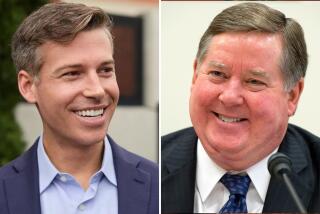Hope, Gallegly Trade Charges of Non-Voting, Mudslinging
- Share via
Until this week, Republican candidates in the 21st Congressional District race--which include the son of entertainer Bob Hope and the mayor of Simi Valley--followed the GOP’s so-called 11th Commandment: Thou shalt not bad-mouth a fellow Republican.
But that rule of silence was shattered Thursday when Tony Hope and Elton Gallegly angrily traded charges, including an accusation that the campaign was being turned into a mudslinging affair.
The heated words began after Gallegly’s campaign consultant provided certified documents to reporters this week indicating that Hope, a former Washington attorney, has not voted in any election for several years.
Records from the Board of Elections and Ethics in Washington indicate that Hope, who moved to the District of Columbia from Malibu in 1975, did not register to vote in Washington until January, 1986. Hope registered to vote in Los Angeles in February when he moved to the Valley to run for Congress.
The last time Hope said he recalled voting was in the 1976 presidential election, when he voted for Gerald R. Ford on a California absentee ballot.
Attempts to Register Told
Hope said he tried unsuccessfully to register by mail at least twice during the 10 years he lived in the District of Columbia.
Hope launched his counterattack Thursday morning before a gathering of Republican women in Calabasas. He accused Gallegly of starting a “smear campaign.”
“I deplore the violations of the 11th Commandment,” said Hope, who also accused Gallegly of spreading rumors that his wife, Judith Hope, was a member and possibly a director of the American Civil Liberties Union, an organization identified with liberals.
Judith Hope, who co-chaired Lawyers for Reagan-Bush ‘84, has adamantly denied the rumor.
Gallegly’s campaign consultant, Ben Key, acknowledged that he had asked several people if it was true that Judith Hope was affiliated with the ACLU, but he denied starting the rumor.
Hope also accused the Simi Valley mayor of ducking any opportunities to debate the issues with him. Gallegly said scheduling difficulties have prevented him from debating Hope so far.
Meanwhile, the GOP’s dark-horse candidate in the race, Tom La Porte, a stockbroker from Thousand Oaks, blames Gallegly for the breach in Republican decorum.
La Porte suggested that Gallegly “quit spending
money to dig up dirt on Tony Hope and spend money on researching to answer questions of importance to the voters of the district.”
The three Republicans are vying for the seat being vacated by Rep. Bobbi Fiedler (R-Northridge), who is running for the U. S. Senate. The heavily Republican district includes parts of the West San Fernando Valley, the Sunland-Tujunga area, eastern Ventura County and Santa Catalina Island.
Gallegly called his investigation of Hope’s voting record a standard practice in any campaign.
“It’s up to the voters to determine how significant it is,” Gallegly said. “As an American, I think it’s a very significant issue.”
‘I’d Be Kicking in Doors’
Gallegly said Hope’s explanation for why he did not vote is unsatisfactory. “If someone did anything to deprive me of the right to vote . . . I’d be kicking in doors,” he said.
Hope said he registered by mail in 1980 and 1984 in the District of Columbia but that when he tried to vote in the presidential elections he was turned away because his name was not on the rolls. He blamed his problems on poor record-keeping at the election office and possibly the district’s Democratic bias.
Emmett Fremaux, executive director of the elections board in Washington, acknowledged in an interview that voter rolls were inaccurate before 1983. Among other problems, he said, the rolls were bloated with the names of tens of thousands of dead people and those who had moved. But he vouched for the accuracy of the voter records since that time.
Hope predicted that revelations about his voting record will not hurt him.
“I don’t think this is going to be a problem. The voters don’t like smear campaigns,” he said.
More to Read
Get the L.A. Times Politics newsletter
Deeply reported insights into legislation, politics and policy from Sacramento, Washington and beyond. In your inbox twice per week.
You may occasionally receive promotional content from the Los Angeles Times.










